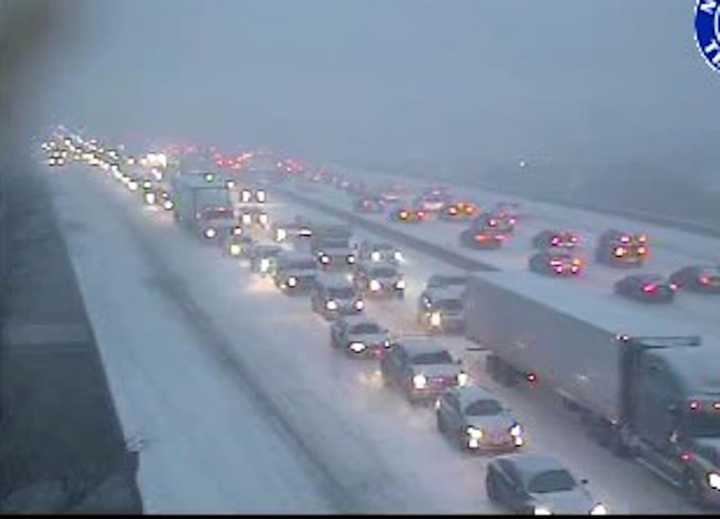The storm caused havoc on roadways and created a nightmare for state and local officials who had not prepared for such heavy snow and sleet.
What happened? The changeover to sleet happened about two to three hours later than was predicted, causing snowfall accumulation totals to be higher than expected.
One thing is for sure. Commuters are mad as hell and want to know why officials weren't prepared.
"Traffic was at a complete standstill in Pleasantville for over an hour," a local woman told Daily Voice. "Employees commuting home averaged four to five hours on the road. Clearly, no towns properly prepared for this. The response was way beyond acceptable for safety."
Westchester County Executive George Latimer said at a Friday morning news conference that the storm came in slower and heavier than anyone expected.
On Facebook, Latimer said that everyone had a miserable commute and that many just "sucked it up."
"Some asked legitimate questions about preparedness," he said. "And some used it to launch off on elected officials, like punching bags".
It was perplexing that all the towns in Westchester and the surrounding areas were either so unprepared or unable to deal with the forecasted storm, said Pleasantville resident Karen Lehman.
"There was little communication on the media of alternate routes, why traffic was at a standstill or what was being done. We have to do better on all fronts for the sake of public safety," she added.
Rockland County Executive Ed Day agreed.
"After many conversations with the State and the Governor’s Office, I have been assured that they will conduct a thorough post-event analysis," said Day. "On the local level, Rockland County will be doing the same and coordinating with the towns to develop strategies about how to deal with major state roadways being shut down."
He added that it was clear that the New York and New Jersey State DOTs did not respond to this storm in a timely manner.
"Conditions on the roads deteriorated very quickly from this fast-moving storm. Backups on major State roads like the Thruway, Palisades Parkway, Routes 59, 9W, 303, 304, etc. led to backups on local roads which prevented plows from being able to respond and clear the roads as necessary. The bottom line is that when traffic is not moving, plows cannot get to where they need to go," he added.
Lehman, who had several employees stuck in traffic for at least four or five hours, said they don't want to blame crews that do the work.
"I don’t want to seem to be criticizing the crews that work so hard, just to ask that communication options or planning is reviewed."
A much similar problem existed in Connecticut where state police responded to some 230 accidents due to the weather, one of them fatal.
“It’s the first snow of the season and the CT State Police would just like to remind all you Connecticut drivers to be careful out there in our roads,” state police said. “Common sense, as always, prevails while driving in snowy weather. First and foremost, slow down on icy snowy roads.”
Click here to follow Daily Voice Briarcliff and receive free news updates.

